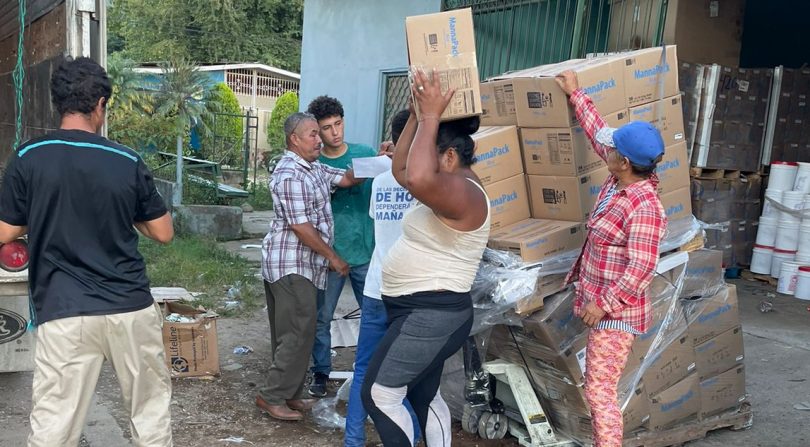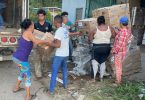(Relief supplies being delivered to flood victims in Honduras)
A God That is Present
By Bishop Chris Giesler
Scripture Text: Matthew 2:13-23
Our Gospel lesson for this week takes place just after the Magi have left the house where Jesus and his family were at the time of their visit. We will read more about that visit next week as we begin the season of Epiphany. This week, we take a step ahead and read what happened next. As we read this text, remember that these Magi, Kings, or, more to the point, Astrologers had met with King Herod on their way to Bethlehem. He had asked them to return to him to let them know where the baby was so that he could come and worship himself. But they had been warned in a dream and returned to their home by another way. And so they did.
Who would ever choose to be forced into being a refugee, having to leave your hometown, and live in a foreign country – a country that had for centuries been an enemy to your people? I don’t think any of us would want that.
But this is precisely what happened to Mary, Joseph, and the baby Jesus. At Christmas time, we think about a story that was supposed to bring peace and goodwill to everyone. But the next time you gaze into a manger scene, ponder what was happening behind the scenes. As we pick up the story in Matthew’s Gospel this week, it is hardly peaceful. This is not a happy story because Jesus’ life has been threatened. The children of innocent families are being killed, and mothers are weeping inconsolably. Joseph’s dream world is filled with visitations from angels, and he is instructed to take his wife and child to Egypt.
What do we know about Egypt?
- It was a place of captivity, forced labor, and abuse.
- A country ruled by Pharaoh, who, in Moses’ day, sought to kill the male children of the Israelites to further subjugate them. The same thing Joseph is now concerned about.
- Egypt was also where God’s hand moved to bring his people out of bondage and the beginning of a 40-year journey in the wilderness, bringing them to the Promised Land.
- But now, for Jesus and his family, Egypt is not a place of captivity but a place of refuge.
If the calendars are correct, Jesus would have been about six years of age when the family returned to Israel. They settled in Nazareth because, according to Matthew, Herod’s son Archelaus was ruling the region around Bethlehem, and he was known for being the most ruthless of Herod’s three sons.
We are all profoundly influenced by the circumstances in which we spend our early lives, even if we can’t remember them very well. Just think, for instance, about Jesus’ ministry and his constant concern for the poor and needy. How often did he challenge his listeners to be aware of the stranger?
- In Matthew 25, Jesus says, “When you did it to the least of these, you did it also to me.”
- In the Temple, Jesus says, “You have turned this house of prayer for all people into a den of robbers.”
The plain truth is that life is difficult, and even the miracle of Jesus’ birth (Christmas” does not change that.
- None of us would choose to be refugees.
- None of us would choose to have our bodies break down as we age
- None of us would choose to have mental illness impact our family’s
- None of us would choose cancer, heart disease, or stroke to find its way into our lives
- None of us would choose the sudden death of a loved one to a vehicular accident
But these things do happen. Our lives do go through difficult times. The true meaning of Christmas, the true meaning of Jesus’ birth, is that even in our difficult moments, we have a God who is present with us. We have a God who understands adversity.
This is what we are called to do as well. Our mission is to be God’s presence in the difficult moments that others are experiencing. Our Moravian siblings in Honduras have been dealing with a series of floods that span years. Crops, time and time again, have been wiped out. But recent donations to the Board of World Mission have enabled us to purchase seeds to replant and to enlist the services of an agronomist who is helping the farmers to move their fields to higher ground to avoid floods. They are also helping to get water up to those fields and to build silos to keep the seeds for the next harvest. All of this will pay huge dividends in the years ahead.
Your communities need a compassionate presence as well. What can you do in Jesus’ name?







